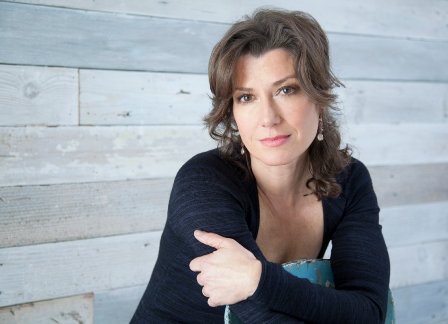But Grant seems aware if she wants credibility as an artist, she has more work to do, most of it outside the traditional Christian comfort zone. In the publicity campaign for the new album, she has included the gay press, acknowledging for the first time a part of her audience that has been with her since she was a teen. "I know that the religious community has not been very welcoming," she told a St. Petersburg publication, "but ... the journey of faith is just being willing and open to have a relationship with God. And everybody is welcome."
--From the following post by:
In the Huffington Post on 7-9-13
Whatever you think you know about Amy Grant, you're probably wrong. In the ten years since she released her last full-fledged studio album, the so-called queen of Christian rock has been taking a turn as mom and daughter, nursing ailing parents and raising children with her husband, country star Vince Gill.

But Grant has also quietly been working to transform herself into a performer that fits none of the roles invented for her previously by the church, the recording industry, and the media: not a petticoats-and-cowboy boots evangelical icon, nor a milquetoast Madonna, not a satanic sellout nor a stealth proselytizer.
The Amy Grant that appears on her new album, How Mercy Looks From Here, her first in a decade and one of her best, is a mature songwriter pushing at hard experience to elicit her truth and enlisting accomplices from the secular music world, like Sheryl Crow and her childhood idols Carole King and James Taylor, to expand her reach and her sound. Faith is a fact of Grant's existence, but the text she's preaching from in these songs is her own life.
"The great thing about a song is that no one has to know your story," Grant said in a recent interview. "But if you tell it in a way that has clarity and means something to somebody else, then it can apply to their story." But anyone who has followed Grant's career will hear her reviewing the turns her story has taken. From the opening track, "Better Not to Know," about the dissolution of her first marriage, to the title track recalling memories of her mother dredged up by the 2010 flooding in Nashville, the album, though full of optimism, is haunted by loss.
God, Grant makes clear, has redeemed many of her regrets. "Don't Try So Hard," a song about being the overscheduled mother of overscheduled children, contains an unmediated statement of justification by faith: "God gives you grace and you can't earn it/ ... Gave you His Son so you'd believe it/You're lovely even with your scars/Don't try so hard." Despite what her detractors from the fire-and-brimstone wing of Christianity have often maintained, it's hard to think of another contemporary Christian artist who enunciates the evangelical message any more clearly than Grant.
But neither is any Christian artist so obviously intent on making her faith part of her artistic stance, instead of the other way around. It was Grant whose celebrity as a teenager in the 1970s drew the attention of the major record companies to Christian rock, and made "crossing over" to the secular market a mark of success in the hermetic evangelical industry. How Mercy Looks From Here hints that Grant's ambition is still to erase the line between Christian and secular genres, but to do it without leaving home.
read the rest: How Amy Grant Is Changing Christian Rock Again
No comments:
Post a Comment